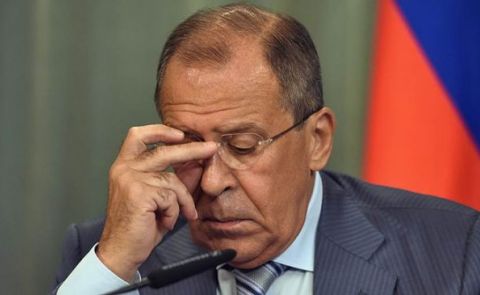
Aliyev and Pashinyan Share Views on Karabakh Conflict and Peace Process
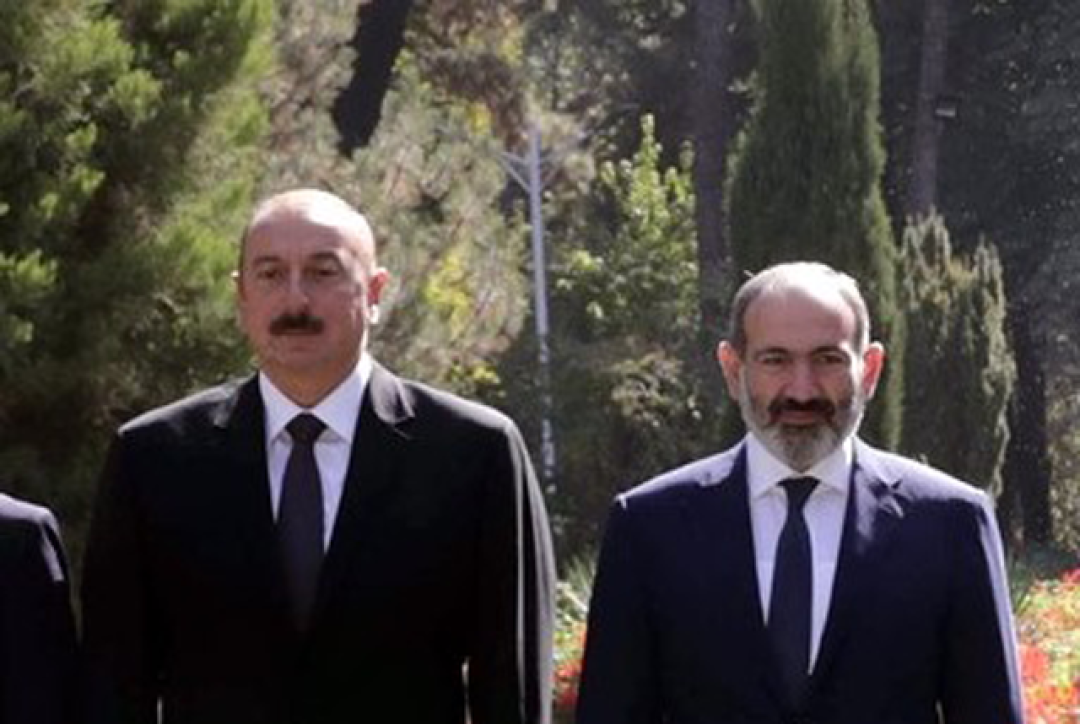
The leaders of Azerbaijan and Armenia shared their views on the Karabakh conflict with the "Euronews" channel. Anelise Borges, the international correspondent of "Euronews" asked the same questions to the President of Azerbaijan, Ilham Aliyev, and Prime Minister of Armenia, Nikol Pashinyan, separately.
Question: Nagorno Karabakh has been the stage of the most violent episodes in the South Caucasus in recent history. And tensions have not gone away since the 2020 peace deal. To what do you attribute the constant hostility?
Pashinyan said: "First of all, the document signed on November 9, 2020, is not a peace treaty or peace deal as you said, in its legal sense. But not so much de jure as de facto, a number of its provisions are grossly violated. Azerbaijan continues to claim there is no Nagorno-Karabakh, although the November 9 trilateral statement defines the existence of Nagorno-Karabakh as an entity, and the President of Azerbaijan signed that statement. Moreover, he agreed that there is a line of contact in Nagorno Karabakh, and Nagorno Karabakh has a territory defined in paragraph 7 of the trilateral statement. Moreover, paragraph 7 of the statement provides that refugees and internally displaced persons shall return to the territory of Nagorno Karabakh and the adjacent districts under the auspices of the UN High Commissioner for Refugees. Unfortunately, to date, Azerbaijan has not secured this right. Moreover, they are carrying out constructions in several villages that the Armenian population was forced to flee from during the war, and Azerbaijan declares that it will resettle these territories with Azerbaijanis."
Aliyev stated: "I thought that after the Second Karabakh War, the situation would be different. We were ready for peace and actually waiting for a while for international players to give us some new suggestions. We understood that it's kind of vague. Nobody knows what to do. And the situation when we had the declaration signed on November 10, 2020, was not providing sustainable peace. It wasn't a peace treaty. It was a declaration. Actually, de facto, that was a capitulation act by Armenia. Therefore, we started to put forward some initiatives to find the final solution to our conflicts with Armenia. We made it public and announced that we need to sign a peace agreement."
Question: "Peace talks have been filling many people with hope of lasting peace between Armenia and Azerbaijan. Are we right to be hopeful, considering what came out of this latest round?"
Pashinyan emphasized: "Not only there can, but also must be peace. This is my belief, my position; this is what I believe in." He added: "Let me go back to our penultimate meeting in Brussels when we agreed, reached an agreement with the President of Azerbaijan in the presence of European Council President Charles Michel, that Armenia and Azerbaijan mutually recognize each other’s territorial integrity with 29.800 sq. km in the case of Armenia and 86.600 sq. km in the case of Azerbaijan. After that, Charles Michel made a statement about that, after which, when an Armenian journalist asked me about it, I publicly confirmed that fact. Up to this point, the President of Azerbaijan has not publicly confirmed that agreement. He has not denied it either, but this is a subtlety that creates a certain lack of trust."
Aliyev stated, " I think it is the right thing to be hopeful, but I can tell you that peace negotiations have been held by foreign ministers. Our meetings in Brussels were organized by the President of the European Council. These meetings actually allow us to touch upon very sensitive issues. But if we see a constructive approach from the Armenian side, and most importantly, if they totally put down all their aspirations to contest our territorial integrity, then we can find a peaceful solution very soon, maybe even by the end of the year."
Question: "What about the mediation of the EU? Many international actors have attempted to mediate this crisis; Russia, the USA, and now the European Union have been playing a bigger role. What do they bring to the negotiating table?"
Pashinyan answered: "For the Brussels platform, the problem we see, and it has been a continuous problem, is that around the table, we reach a certain understanding, and we do this in the presence of the President of the European Council. And if one of the sides does not address or fulfill that agreement, this is not followed even by specific assessments. Here is an example: in my presence and the presence of the European Council President, back at the end of last year, the President of Azerbaijan promised and undertook that within 15 days, they would let free ten prisoners. They have not fulfilled that commitment so far. On the other hand, I assume that effective mediation is when the failure to fulfill an agreement would be followed by at least a show of political attitude towards the one that fails to fulfill that commitment. In the Brussels platform, we are not seeing this; I keep raising this issue. Let me reveal a secret. We have even prepared a document that we called an "audit," where we list the understandings that were reached at the Brussels platform but were subsequently not fulfilled. That’s quite a thick package, which is alarming."
Aliyev said, "We think that taking into account the level of cooperation between Azerbaijan and EU, and Armenia and EU, it's natural to be active. Especially when, after the Second Karabakh War, the Minsk Group was no longer functional. It is not functioning any longer. So, there should have been some international institutions. I thought that the EU can be the best because our relations with the EU are based on mutual respect, mutual trust, and mutual interest. So, this initiative now is transforming into a very active format of dialogue because we meet not only in Brussels, we also meet, for instance, on the sidelines of the European Political Community."
Question: "Do you think that the growing mediation of the West, the EU, but also the United States has somewhat antagonized more traditional powerbrokers here in the region, Russia, or the other way around the fact that Russia has somewhat been bogged down in Ukraine has left some space for potentially Azerbaijan and Armenia to come to common ground?"
Pashinyan noted, "Let me remind you that this international competition seems to not be linked to us directly because you know the platform of the OSCE Minsk Group Co-chairs was active, and it was created for addressing the Nagorno Karabakh conflict. But since February 24, 2021, the Co-chairs simply stopped interacting, some of them decided they did not want to interact with the others. What you say or what I call geopolitical jealousy emerged after that date. Before that, such a genre did not exist. But on the other hand, it would, of course, be more productive if the international partners bring together their efforts. There have recently been signs that, nevertheless, they are somewhat interested in this latter logic."
Aliyev stated: "Russia was a mediator of a ceasefire agreement or declaration of November 10, 2020. It was not the United States or the EU. Our first meetings with my Armenian colleague were organized by Russia in Russia. So, after the Russian-Ukrainian war, the situation has changed. We started to see that the United States and Europe became more active. It's not actually a big difference for us who will lead the process or who will, to a certain degree, monopolize the negotiation process. It is important to come to a result. Whichever actor can produce initiatives that will lead to the peace agreement, we will support it. By the way, negotiations between our foreign ministers were held in Washington. Now, we got an invitation from Russia to hold a round of negotiations in Russia later this month, and we agreed. So, if there's some other location, of course, we will agree. It's important for us to come to an agreement and to have a result. Of course, we understand certain geopolitical rivalries and some players' attempts to be more active. We can only appreciate if there's a healthy rivalry, which will lead only to good results."
Question: "What would you say about Russia’s influence in this region today?"
Pashinyan said: "I have to emphasize that I have not received any invitation yet. As to Russia's presence, of course, by virtue of the events in Ukraine, the interest of not just Russia but also other geopolitical actors in our region has been declining because, in practice, the whole international attention is focused on Ukraine. And that is a factor."
Aliyev emphasized, "We can only observe Russia's interaction with our neighbors in the Southern Caucasus. But as far as Azerbaijan is concerned, not many things have changed because our relations with Russia were already balanced."
Question: "What do you know of what's happening in the Lachin corridor right now?"
Pashinyan noted, "Regarding the International Court of Justice. I want to view it separately from the other factors you listed because the decision of the International Court of Justice is legally binding, that is the highest international Court, the decisions of which have the highest legal force." He added: "Now, about what's happening in Nagorno Karabakh. There is a humanitarian catastrophe in Nagorno Karabakh. What is a humanitarian catastrophe? No food is being supplied to Nagorno Karabakh. There is no external supply of food. Several essential commodities are not being supplied, baby food is not supplied, medication is not available, no hygiene supplies, no other essential goods are there, natural gas supply to Nagorno Karabakh was interrupted by Azerbaijan, electricity supply to Nagorno Karabakh was interrupted by Azerbaijan, the supply of fuel was interrupted by Azerbaijan. So in this sense, there is a real threat of hunger, we are facing there as well as health problems, and so on."
Aliyev said, "Well, actually, for more than two years since the Second Karabakh War ended, the so-called Lachin corridor functioned. It functioned during the times of occupation with one difference. It was under the control of the Russian peacekeepers, which was part of the trilateral declaration. There was no disruption, and there were no steps from our side to interfere. In the meantime, the situation on the ground was changing. The reason why representatives of the civil society of Azerbaijan, to a certain degree, started to control the corridor was because of the fact that illegal excavation of natural resources in Karabakh restarted at the beginning of November last year. We have seen that iron ore and golden ore were transported by trucks from Karabakh to Armenia accompanied by Russian peacekeepers. So, we were denied the right to access, and that is how our civil society representatives started to control it."
Question: "Some 5,000 people lost their lives in 2020 on both sides. I was here. I came to Nagorno-Karabakh, and I met many mothers of fallen Armenian soldiers. I've also witnessed the pain and devastation on the other side, on your side, through the work of my colleagues here in Azerbaijan. But I remember speaking to one mother, in particular, who told me she blamed politicians for the war and for the death of her son. Saying that politicians should diplomatically deal with things and not fall into the trap of war. What would you say your mission is? Is it to win a war or to bring lasting peace?"
Pashinyan emphasized: "You know, in any case, war is wrong. But from the other side, what's the cause of war? The cause of war is the impossibility of reaching durable reach or maintaining peace, and another question is if that impossibility genuine, is it real, is that authentic."
Aliyev stated, "Well, to win a war was a mission of my life, of my political life, which ended successfully. So, we won the war despite many factors, political, despite factors of long-lasting infrastructure projects on the occupied territories, which made it very difficult for our military servicemen to break several defense lines. They had in some parts five, seven defense lines full of mines."
Aliyev questioned, "Now we see how Europe and the West are united to help Ukraine to fight against separatism. And why, in our case, our fight against separatism is treated differently? Why is Georgia's approach to separatist regions fully understood by Western communities and politicians, and our legitimate, the same origin desire to end separatism is under question? Why does Spain not allow Catalonia to have a referendum, though there are five or six million?"
Question: "Do you have a message for those who may be watching us right now?"
Pashinyan said, "You know, I think it's not a good genre because when two politicians are speaking with one another, it's the two peoples speaking to one another because on the one side is the person elected by those people, and on the other side is the person elected by the other people. Therefore, everything I said now is an international platform, and this is also addressed to those people, but if there is something to communicate, I would say what I have been saying from the start; everything I said is also addressed to the people of Azerbaijan. But in those cases, sentences that people normally say – oh, we have long lived here, and we will be long living here. I think all the words have already been said."
Aliyev stated: "First, if they listen to what I say, the message to Armenians in Armenia is that we want to have peace with their state; we don't have territorial claims to Armenia, although hundreds of thousands of Azerbaijanis who had lived in Armenia before the war were totally ethnically cleansed, and their cultural and religious heritage was totally destroyed. Nevertheless, we don't have any territorial claims." He added, "For them, the choice is between very bad and acceptable, but acceptable based on common sense, on international law, and on recognizing the rights of Azerbaijanis to live on their own land, which they deprived us for 30 years. And for Armenians in Karabakh, I'd like to remind them that we started contact with them spontaneously. It was mainly people-to-people contacts when we started to build a new Lachin road, which passed through several villages where the Armenian population live. I was informed that contacts had been established between our road construction workers and the Armenian community, and immediately they became almost friends."
See Also

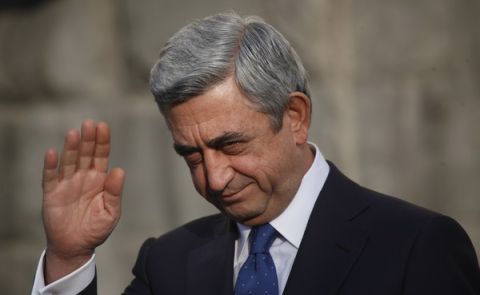
Serzh Sargsyan Rejects Charges, Backs Impeachment, and Warns of Secret Deals
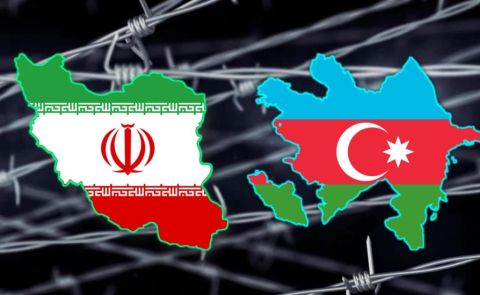
Azerbaijan Confirms Execution of Terrorist Behind Embassy Attack in Iran
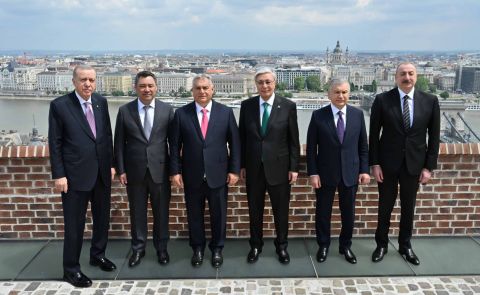
Turkic Leaders Adopt Budapest Declaration, Emphasizing Peace, Trade, and Digital Connectivity
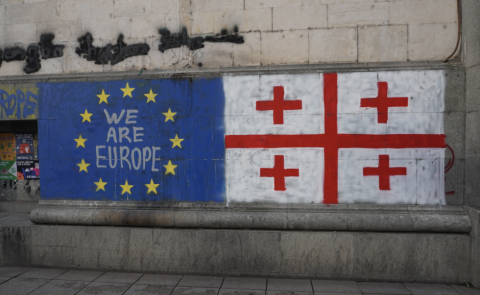
International Officials Criticize Georgian Dream Amid Democratic Concerns

